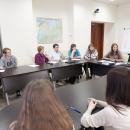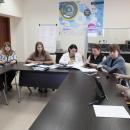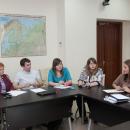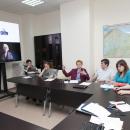“EU Days” in Archangelsk
From May 21 to May 23 “EU Days” were conducted in Archangelsk. They were organized by the Northern (Arctic)FederalUniversitynamed after M.V. Lomonosov within the framework of the project “Establishing the EU Centre in the Barents Region of Russia”, implemented under the financial support of the European Union.
On May 21, 2014 the presentation of the Barents EU Centre and the lecture in English on the cultural history of the European Union were arranged for the students of the program “Russian Studies”. The same lecture in Russian had been already conducted on May 22, 2014 by the lecturers of theInstituteofHumanities, Social and Political Sciences for future historians and diplomats. Within the framework of “EU Days” the round-table discussions “Cultural Processes in the Countries of the European Union” was organized. European cultural trends were discussed by the lecturers and students from NArFU and the guests from Naryan-Mar.
The topic of discussion was chosen in connection with the questionable results of the contest “eurovision-2014”. Students touched upon the history of contest establishment and its role in the modern media-processes and show business, as well as analyzed interrelation between the policy of the EU and the basic trends in the modern European culture. The main issue which kept its significance during all discussions was – is there future for European musical culture? Was Conchita Wurst’s victory a new stage in cultural development or is this a herald of decline of European culture? The topic of mass culture quickly grew into hot discussions. The participants divided into two groups: supporters of moral freedom, usage of freaky characters and shock methods for attraction of attention and supporters of traditional values and academic approach. Using the examples of interrelations of different countries and nationalities, the organizers described the trends of the modern pop-culture and introduced to students the creative teams who took part in the contest “Eurovision”. Mostly the musicians participating in this contest are widely-known only in their own countries and only some of them manage to become the world stars. The exceptions are ABBA, Loreen, Dana International.
The participants of discussion tried to give a response to the question – why did Austrian singer Conchita Wurst took the first place and get such a great points? The perspectives for the contest were also analyzed. It was pointed out that the participants of “Eurovision” have surprised much for the last five years. Students discussed the criteria for defining a winner and taking into account the information about the leaders of previous years had a dispute devoted to selection of national representatives and forecasting of contest results.
International relations also weren’t left out in the cold. Students conducted analysis of voting results of the last three years and voting results given by neighbor countries who estimate each other. The most remarkable were the mutual estimation by Balkan States, countries of Eastern Europe andScandinavia. The second part of discussion gave all participants the opportunity to reestimate the nominees for the victory in the contest “Eurovision” and deliver a verdict related to the results of European song contest. The differences from the original results were minimal. The objective voting allowed to conclude that our subjective visual perception prevents from seeing the true value of good musical performances.




<<< back


